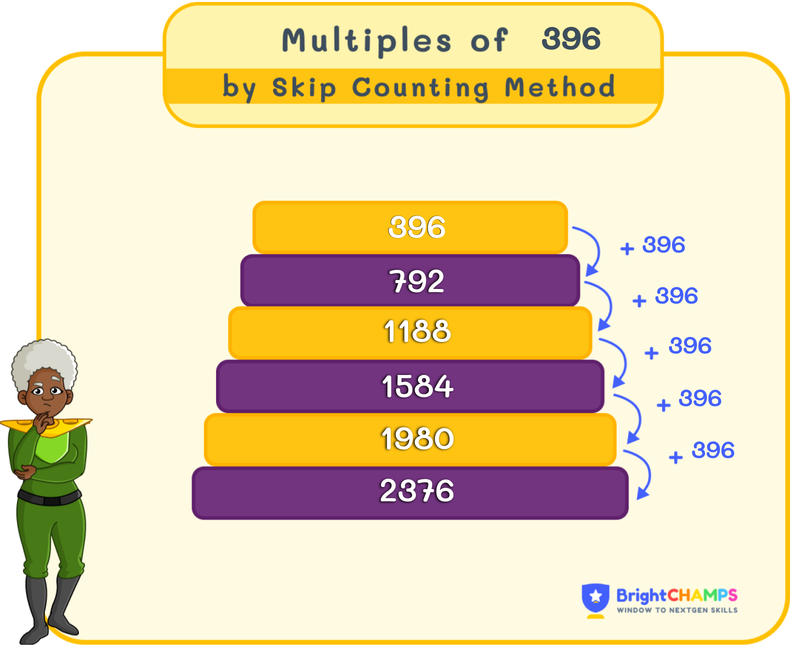


 125 Learners
125 LearnersLast updated on May 26th, 2025

Multiples of 396

In math, multiples are the products we get while multiplying a number with other numbers. Multiples play a key role in construction and design, counting groups of items, sharing resources equally, and managing time effectively. In this topic, we will learn the essential concepts of multiples of 396.
What are the Multiples of 396?
Now, let us learn more about multiples of 396. Multiples of 396 are the numbers you get when you multiply 396 by any whole number, including zero. Each number has an infinite number of multiples, including a multiple of itself. In multiplication, a multiple of 396 can be denoted as 396 × n, where ‘n’ represents any whole number (0, 1, 2, 3,…). So, we can summarize that:
Multiple of a number = Number × Any whole number
For example, multiplying 396 × 1 will give us 396 as the product. Multiples of 396 will be larger or equal to 396.

List of First 20 Multiples of 396
Multiples of 396 include the products of 396 and an integer. Multiples of 396 are divisible by 396 evenly. The first few multiples of 396 are given below:
| TABLE OF 396 (1-10) | |
|---|---|
|
396 x 1 = 396 |
396 x 6 = 2376 |
|
396 x 2 = 792 |
396 x 7 = 2772 |
|
396 x 3 = 1188 |
396 x 8 = 3168 |
|
396 x 4 = 1584 |
396 x 9 = 3564 |
|
396 x 5 = 1980 |
396 x 10 = 3960 |
| TABLE OF 396 (11-20) | |
|---|---|
|
396 x 11 = 4356 |
396 x 16 = 6336 |
|
396 x 12 = 4752 |
396 x 17 = 6732 |
|
396 x 13 = 5148 |
396 x 18 = 7128 |
|
396 x 14 = 5544 |
396 x 19 = 7524 |
|
396 x 15 = 5940 |
396 x 20 = 7920 |
Now, we know the first few multiples of 396. They are 0, 396, 792, 1,188, 1,584, 1,980, 2,376, 2,772, 3,168, 3,564, 3,960,...
Operations with Multiples of 396
Understanding the multiples of 396 helps solve mathematical problems and boost our multiplication and division skills. When working with Multiples of 396, we need to apply it to different mathematical operations such as addition, subtraction, multiplication, and division.
Sum of first 5 Multiples of 396:
396, 792, 1,188, 1,584, and 1,980 are the first five multiples of 396. When multiplying 396 from 1 to 5, we get these numbers as the products.
So, the sum of these multiples is:
396 + 792 + 1,188 + 1,584 + 1,980 = 5,940
When we add the first 5 multiples of 396, the answer will be 5,940.
Subtraction of first 5 Multiples of 396:
While we do subtraction, it improves our comprehension of how the value decreases when each multiple is subtracted from the previous one. 396, 792, 1,188, 1,584, and 1,980 are the first five multiples of 396. So, let us calculate it as given below:
396 - 792 = -396
-396 - 1,188 = -1,584
-1,584 - 1,584 = -3,168
-3,168 - 1,980 = -5,148
Hence, the result of subtracting the first 5 multiples of 396 is -5,148.
Average of first 5 Multiples of 396:
To calculate the average, we need to identify the sum of the first 5 multiples of 396, and then divide it by the count, i.e., 5. Because there are 5 multiples presented in the calculation. Averaging helps us to understand the concepts of central tendencies and other values. We know the sum of the first 5 multiples of 396 is 5,940.
396 + 792 + 1,188 + 1,584 + 1,980 = 5,940
Next, divide the sum by 5:
5,940 ÷ 5 = 1,188
1,188 is the average of the first 5 multiples of 396.
Product of First 5 Multiples of 396:
The product of given numbers is the result of multiplying all of them together. Here, the first 5 multiples of 396 include: 396, 792, 1,188, 1,584, and 1,980. Now, the product of these numbers is:
396 × 792 × 1,188 × 1,584 × 1,980 = 2,958,458,982,400
The product of the first 5 multiples of 396 is 2,958,458,982,400.
Division of First 5 Multiples of 396:
While we perform division, we get to know how many times 396 can fit into each of the given multiples. 396, 792, 1,188, 1,584, and 1,980 are the first 5 multiples of 396.
396 ÷ 396 = 1
792 ÷ 396 = 2
1,188 ÷ 396 = 3
1,584 ÷ 396 = 4
1,980 ÷ 396 = 5
The results of dividing the first 5 multiples of 396 are: 1, 2, 3, 4, and 5.

Common Mistakes and How to Avoid Them in Multiples of 396
While working with Multiples of 396, we make common mistakes. Identifying these errors and understanding how to avoid them can be helpful. Below are some frequent mistakes and tips to avoid them:

Multiples of 396 Examples

Problem 1
Tina is organizing a charity raffle. Each ticket book contains 396 tickets. If she distributes these ticket books equally among 5 community centers, how many tickets are distributed in total?

1980 tickets
Explanation
To find the total number of tickets distributed, multiply the number of ticket books by the number of tickets in each book.
Number of ticket books per center = 1
Number of community centers = 5
Number of tickets per book = 396
396 × 5 = 1980
Therefore, a total of 1980 tickets are distributed among the community centers.

Problem 2
A warehouse stores 396 pallets of goods each month. If the warehouse receives deliveries for 3 consecutive months, how many pallets will it have received in total?

1188 pallets
Explanation
Multiply the number of pallets received each month by the number of months to find the total.
Pallets received per month = 396
Number of months = 3
396 × 3 = 1188
Therefore, the warehouse will have received a total of 1188 pallets over 3 months.

Problem 3
A company prints brochures in batches of 396. If they complete 7 batches in a week, how many brochures have they printed?

2772 brochures
Explanation
Multiply the number of brochures per batch by the number of batches to find the total number printed.
Brochures per batch = 396
Number of batches = 7
396 × 7 = 2772
Thus, the company prints a total of 2772 brochures in a week.

Problem 4
An event planner needs to set up chairs in rows. Each row contains 396 chairs. If she sets up 10 rows, how many chairs are there altogether?

3960 chairs
Explanation
Multiply the number of chairs per row by the number of rows to get the total number of chairs.
Number of chairs per row = 396
Number of rows = 10
396 × 10 = 3960
Therefore, there are 3960 chairs set up in total.

Problem 5
A library receives a shipment of new books every quarter. Each shipment contains 396 books. How many books does the library receive in a year?

1584 books
Explanation
Multiply the number of books per shipment by the number of shipments in a year to find the total.
Number of books per shipment = 396
Shipments per year = 4
396 × 4 = 1584
Hence, the library receives a total of 1584 books in a year.


FAQs on Multiples of 396
1.How do you find the multiples of 396?
2.What is the LCM of 6 and 396?
3.What are the real-life applications of Multiples of 396?
4.Are multiples of 396 finite or infinite?
5.Is there any odd multiple of 396?
6.How can poems help children in Vietnam memorize the Multiplication Table and Multiples of 396?
7.Can learning the Multiplication Table influence creativity in solving Multiples of 396 challenges for kids in Vietnam?
8.How do language and cultural differences in Vietnam affect the way children learn the Multiplication Table and Multiples of 396?
9.What role does brain development play in mastering the Multiplication Table and Multiples of 396 among early learners in Vietnam?
Important Glossaries for Multiples of 396
- Multiple: A multiple represents the product of a number that may be multiplied by an integer. For example, multiples of 396 include 396, 792, 1,188, 1,584, etc.
- Number pattern: This refers to how numbers are listed. It should follow a certain sequence. Multiples of 396 are the numbers that consist of the number pattern of 396.
- Even number: An even number refers to any number that can be divisible by 2 without leaving any remainder. The last digits of even numbers are 0, 2, 4, 6, or 8. All multiples of 396 are even numbers.
- Divisor: It refers to any number by which another number can be divided without leaving any remainder. 1, 2, 3, 4, 6, 9, 11, 12, 18, 22, 33, 36, 44, 66, 99, 132, 198, and 396 are the divisors of 396.
- Least Common Multiple (LCM): The smallest common multiple that is common to two or more numbers. For example, the LCM of 6 and 396 is 396.



